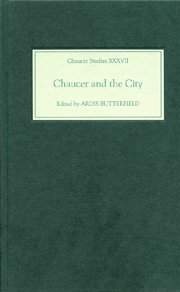Book contents
- Frontmatter
- Contents
- List of Illustrations
- Dedication
- Preface
- List of Contributors
- Abbreviations
- Map
- INTRODUCTION
- LOCATIONS
- COMMUNITIES
- INSTITUTIONS
- 8 Literary Contests and London Records in the Canterbury Tales
- 9 The Great Household in the City: The Shipman's Tale
- 10 London and Money: Chaucer's Complaint to his Purse
- AFTERLIVES
- Bibliography
- Index
- CHAUCER STUDIES
10 - London and Money: Chaucer's Complaint to his Purse
from INSTITUTIONS
Published online by Cambridge University Press: 05 February 2013
- Frontmatter
- Contents
- List of Illustrations
- Dedication
- Preface
- List of Contributors
- Abbreviations
- Map
- INTRODUCTION
- LOCATIONS
- COMMUNITIES
- INSTITUTIONS
- 8 Literary Contests and London Records in the Canterbury Tales
- 9 The Great Household in the City: The Shipman's Tale
- 10 London and Money: Chaucer's Complaint to his Purse
- AFTERLIVES
- Bibliography
- Index
- CHAUCER STUDIES
Summary
What is commonly considered to be Chaucer's final poem, the Complaint to his Purse, is about money: it is a begging poem based on a witty comparison between a recalcitrant mistress and an empty purse. It juggles with the tropes of love poetry and exploits puns in its inimitable serio-comic vein. There have been various attempts to locate Chaucer's inspiration in earlier begging poems by Deschamps, who was, like Chaucer, a royal servant who was often short of money, but none have been particularly persuasive: the fact that both Latin bursa and French bourse are feminine nouns may have been enough to spark Chaucer's imagination, as also may the proverbial collocations between love and money. Or, at a deep level of self-parody, of which he was very capable, Chaucer may have been suggesting that his posture in his earlier days as an unsuccessful lover is matched in old age by a lack of success in acquiring money – since avarice was supposedly a characteristic vice of old age. But, whatever their origin, the puns pour out, in a copiousness which contrasts with the poem's emphasis on lack: the ‘lyght’ (3) – that is ‘unchaste’ – mistress is asked to be serious or stable again (hevy, 4), just as the purse is asked to be filled; the desirable, peerless, golden ‘yelownesse’ (11) of the lady's hair, or possibly complexion, is equated with gold; her wonderful voice (soune, 9) is compared to the jingle of coins.
- Type
- Chapter
- Information
- Chaucer and the City , pp. 162 - 174Publisher: Boydell & BrewerPrint publication year: 2006

